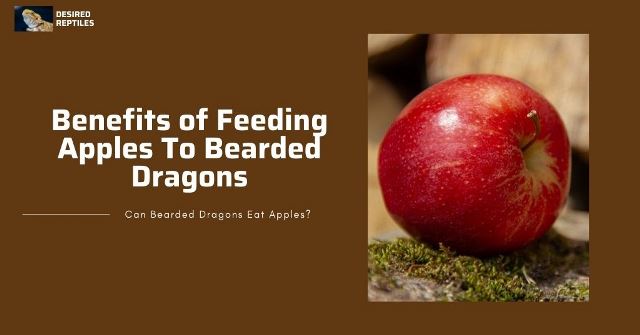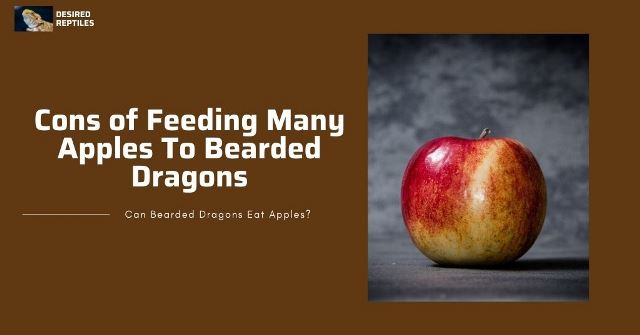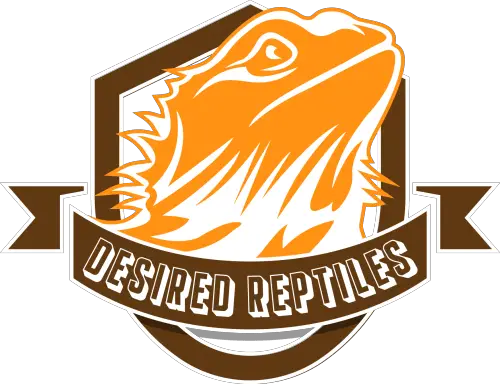Bearded dragons can thrive without fruit in their diet as some of them are nutrient-deficient or even hazardous for them to consume. As primarily opportunistic feeders, they prioritize survival and health, which is often not achieved by eating fruits. Nonetheless, some of them are safe in moderation and can provide valuable nutrients when added to their meals. So, where do apples fit in?
Bearded dragons can eat apples occasionally, and most tend to love them! When given in small amounts, apples can serve as a nutritious snack. However, they can cause your pet to fall ill if consumed in excess.
If you’d like to share a tasty apple snack with your pet, this article will provide tips on how to do so in a way that keeps your bearded dragon happy and healthy. Let’s get started!
Should I Include Apples in My Bearded Dragon’s Diet?
Bearded dragons in captivity often live longer than their wild counterparts due to their access to a more varied, nutritious, and tasty diet. If your dragon is healthy, you can offer it apples in appropriate amounts to enhance its appetite and overall behavior. This will make your time together more enjoyable provided you offer suitable portions.
Note that bearded dragons are quite individualistic with unique likes and dislikes, so much so that your pet may not fancy apples. It’s normal for our scaly friends to have favorite treats and meals. If this is your case, there are alternatives you can offer your pet discussed later in this article.
The Nutritional Value of Apples for Bearded Dragons
Some fruits have similar nutritional profiles and offer comparable benefits to others. To fully understand them, we must start with their nutrient content. According to the United States Department of Agriculture (USDA), one medium-sized apple (182 grams) contains the following nutrients:
- Calories: 95
- Carbohydrates: 25 grams
- Sugars: 10.4 grams
- Fiber: 4 grams
- Protein: 1 gram
- Fat: 0.3 grams
- Vitamin C: 8.4 milligrams
- Potassium: 195 milligrams
- Vitamin K: 5.5 micrograms
While this nutrient list may seem complex, they collectively play various roles in sustaining your pet, and you’ll come to find out how in a jiffy.

5 Reasons Why Apples are Good for Bearded Dragons
Now that we’ve established that apples are safe for bearded dragons, let’s explore the actual benefits this fruit offers.
1. Apples Can Help Improve Activity
Apples contain quercetin which has been shown to manage fatigue. If your pet is a little lethargic, you can moderately feed it some apples to help boost its energy or encourage it to eat more of its meals. This, of course, should be done after appropriate veterinary consultation, as fruits are not medical treatment for your pet.
2. Boosting Energy Levels
For bearded dragons, apples are relatively high in carbohydrates. Paired with quercetin, they can enhance your pet’s energy levels, keeping them fit and energized in their environment. This is particularly useful for bearded dragons who may be prone to lethargy like recovering (after proper treatment), gravid (pregnant), or elderly pets.
3. Apples Can Promote Heart Health
To balance their carb content, apples contain pectin, which can help reduce your beardie’s cholesterol absorption during digestion. Too much cholesterol intake, usually from eating excessive fatty worms, can lead to cardiovascular diseases, most especially in overweight bearded dragons.
4. Added Fiber Advantage
The fiber in apples can help in regulating digestion to ensure proper nutrient absorption before pooping. Without sufficient fiber, your dragon may experience nutrient loss followed by passing difficult stools which can be dangerous in varying degrees.
5. Anti-inflammatory Benefits
Apples are flavonoid-rich fruits, which is mostly evident in red varieties. Flavonoids help in managing inflammation, which is crucial for pets that shed or are susceptible to cuts such as your beardie. Including apples in your pet’s diet can assist your dragon in combating dangerous inflammation and its triggers.

Dangers of Overfeeding Apples to Your Bearded Dragon
Apples may be a nutritious snack, but there are consequences of feeding your pet more than it needs. Such as follows:
Obesity
Though carbs are beneficial, they can quickly turn dangerous in excess leading to unhealthy weight gain. The quercetin in apples does not effectively prevent obesity if your pet eats unhealthy amounts of apples. This can in turn weaken your bearded dragon’s immune system and cause heart and liver problems.
Stomach and Digestive Problems
Apples contain sugars and acids that are relatively too high for your bearded dragon if given in large amounts. Beardies can only handle a mild percent of acidity and sweetness, much less than what our human bodies can. Prolonged intake of high acidity and sugar can disrupt their digestive process, leading to ulcers, indigestion, or diarrhea.
The Risk of Metabolic Bone Disease
The phosphorus and calcium ratio plays a huge role in determining how safe a plant is for your beardie to consume. Ideally, calcium should be twice the amount of phosphorus to reduce the effects of phosphorus binding to calcium. Phosphorus readily binds to calcium, which can interfere with calcium absorption and result in a deficiency.
The direct result of calcium deficiency in bearded dragons is metabolic bone disease; a brutal skeletal illness that weakens the bones leading to physical deformities. The early stages of MBD are treatable, but the disease can quickly turn irreversible and even fatal in extreme cases.
The Safest Way to Feed Apples to Beardies – Know The Limits
As we’ve discussed, the detriments of excessively feeding apples to your beardie are quite unsightly. Moderateness is crucial to prevent your pet from falling ill. Here’s how to achieve that:
Preparing The Apples for Your Beardie
- Choose ripe, fresh apples for your pet as unripe ones are too acidic and harmful. Excess acidity can disrupt digestion by increasing the stomach’s pH, potentially leading to issues like impaction or malnutrition.
- Thoroughly wash the apples with clean water to remove traces of herbicides and pesticides. These agrochemicals are unsafe for bearded dragons, as they cannot effectively eliminate these substances from their bodies like humans.
- Peeling the apple makes it easier for your pet to digest, especially if the skin is particularly tough. Some apples have tighter outer layers, and beardies simply don’t have the time to chew properly.
- Remove the core of the apple before feeding. The seeds are not only highly indigestible but also toxic if consumed.
- Cut the apple into bite-sized pieces, small enough to fit between your dragon’s eyes to prevent choking. Beardies usually gobble up their favorite snacks, oftentimes forgetting to chew properly.
- Always dust with calcium supplement powder before feeding. This can help replace the calcium bound to phosphorus during digestion.
Rations & Frequency
Depending on your bearded dragon’s age, you can eyeball the amount of salad it requires to ensure that apples make up only 20% of that total. Feed your adult dragon apples in no more than that every other week to maintain a stable nutrient intake.
The table below will match your beardie to the quantity of salad it needs based on its age.
| Age (months) | Percentage |
|---|---|
| 0 – 3 (Baby stage) | 30% greens, 70% grubs |
| 3 – 6 (Juvenile stage) | 30% greens, 70% grubs |
| 6 – 9 (Subadult stage) | 40% greens, 60% grubs |
| 9+ (Adult stage) | 70% greens, 30% grubs |
Tippity Tip: Adult bearded dragons typically eat a palm-sized portion of salad, while baby and juvenile dragons usually consume about half that amount. With this in mind, you can easily estimate 10% to 20% of chopped apples to include in their diet, adjusting based on your pet’s specific needs.
Can My Beardie Enjoy Cooked or Processed Apples?
Cooked or processed apples are either heavily nutrient-deficient or contain preservatives that are not suitable for your pet. Feeding your bearded dragons cooked apples or apples processed into any form can be dangerous or counterproductive. Ensure you only provide fresh apples to maximize safety and nutrition.
Green vs. Red Apples: Which is Better for Beardies?
The nutritional value of green and red apples is highly similar. However, red apples contain more flavonoids evident in their pigmentation. They’re also sweeter than green apples, which is fine if fed in moderation. In addition, green apples are more acidic which may upset your pet’s stomach.
Can Bearded Dragons Eat Apple Leaves?
Beardies should never eat apple leaves! They have high phosphorus and oxalic acid content which are the key components of calcium depletion and metabolic bone disease. They can also lead to impaction and kidney problems due to the inability of dragons to digest them properly. Please, keep your beardie away from apple leaves to ensure its safety.
Apple Alternatives for Your Bearded Dragon
Apples are just one of many treats you can offer. Here are some alternatives that can complement apples and provide additional health benefits:
- Beardie-Safe Fruits: Prickly pears, figs, blueberries, strawberries, and mangoes are healthy options when fed moderately.
- Edible Flowers: Hibiscuses and geraniums add nutrients and extra character to your bearded dragon’s diet making feeding more enticing. However, they should be given occasionally to avoid malnutrition.
- Some Herbs: herbs like basil, cilantro, rosemary, chicory, and fennel are safe for bearded dragons. They’re mostly rich in vitamin C, but can also be high in phosphorus and goitrogens which is why they should be fed occasionally.
